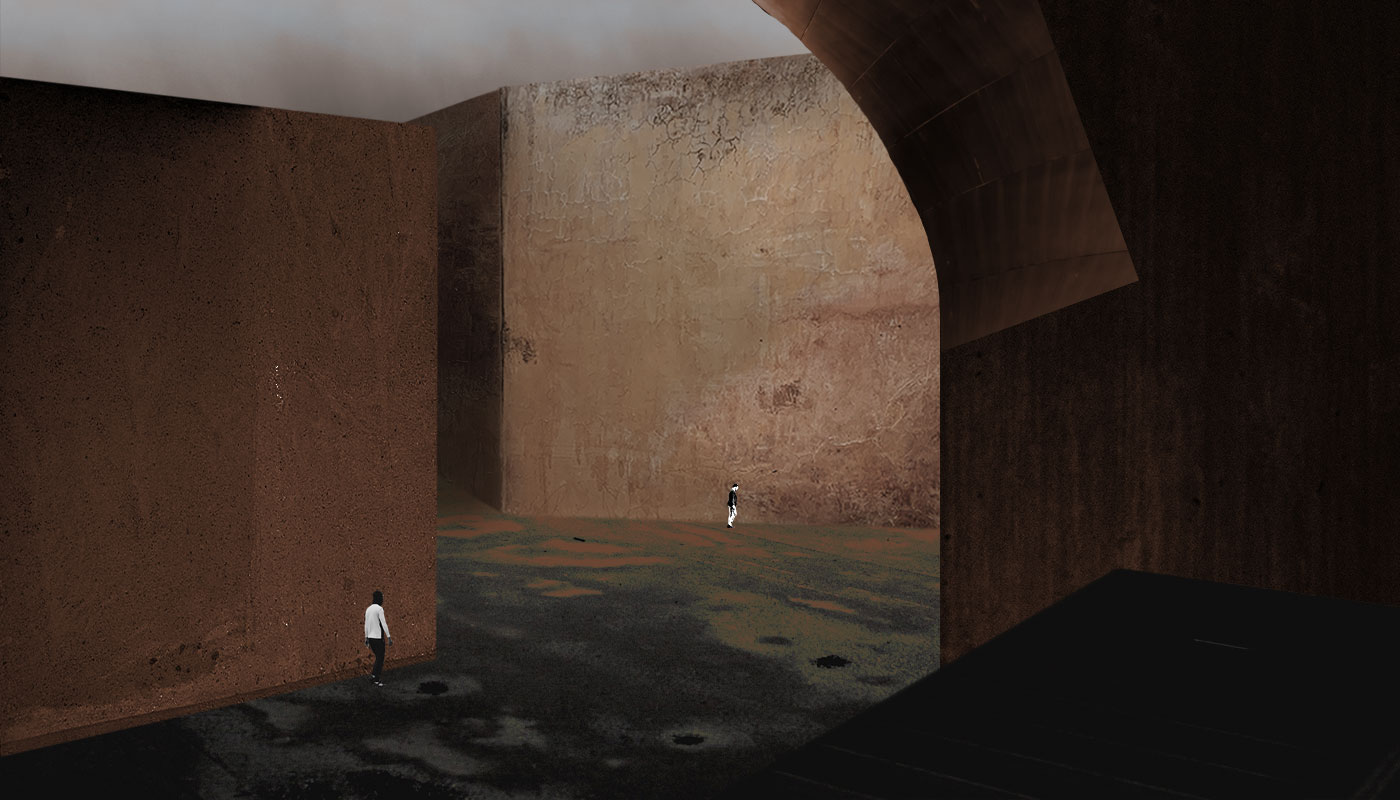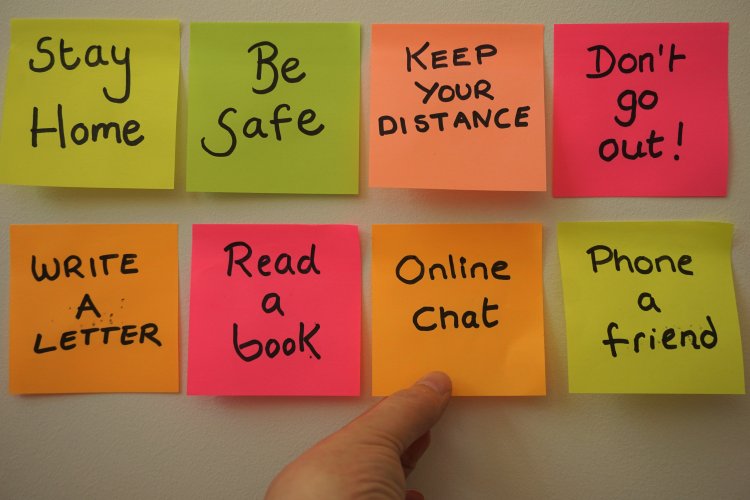Spittoon Presents: The Quarantiner by Evelyn Fok
Spittoon Presents: A foreigner is placed in quarantine in a small housing compound in Shanghai. The neighbors are frightened—they do not approve. Thus begins this tale of our times, by April featured writer Evelyn Fok, attentive to the subtle tensions of the individual and community.
The quarantiner arrived on the Saturday after my first week of fifth grade. I was sitting on the floor watching TV when we glimpsed two hazmat suits huddled at the door next to ours. Mother went into the corridor to investigate. Our neighbors Ah-Ping and Lao Luo were blasting the hazmat suits with questions.
“A quarantiner moved into the sublet,” she said when she returned five minutes later, irritation stamped over her face. “Doudou, I want you to stay in our apartment as much as possible for this upcoming week. No hanging out in the kitchen.”
Father waffled out of the bathroom. “How could a quarantiner move in here?” he asked. “I thought everyone returning to the country has to be in centralized quarantine for 14 days.”
“Apparently they now stay in the hotel for seven days, then go home for seven,” Mother replied. “They say she’s already had two negative tests, but who knows. Let’s just be careful.”
“Why here? This is not her home.”
“Who on earth knows.”
We live on the ground-floor compound at the end of an old lilong in Shanghai’s Xuhui district. There is a shared kitchen in the center of the compound, surrounded by four living units. Lao Luo, who keeps an eye on me when I’m home alone, lives by himself in the unit close to the entrance. Mother told me once that he ran away from his family years ago, but he is like a father to her now. Next to him is Ah-Ping and her parents, whom she wheels out into the alley for fresh air once a day. Ah-Ping’s children left home a long time ago. On the other side of the kitchen, there is us, and then there is the sublet.
The sublet takes in a revolving set of travelers from all over the country; Shanghainese people would never have to rent a place like this in the city. The subletters never stay for more than a couple of days, so we usually pay them little attention besides gossiping about their regional accents and eccentric behaviors. One time, I peeked into the sublet when it was being cleaned in between visitors: it is a simple room the size of our living room, with glass doors that look onto the concrete wall of the opposite compound, a tiny bathroom, and stairs leading up to a lofted bed. The apartment was decorated with bright paintings and plump cushions; it looked nothing like the bare orderliness of our home just next door. The sublet had been mostly empty since travel was suspended at the beginning of the year.
Besides the sublet, our doors are open most of the day. Things were difficult during the lockdown, when I had to take classes on my phone from 8am to 4pm every day, next to my parents doing work calls, while Ah-Ping and Lao Luo hollered constantly at the news blaring from the TV. Things have been more or less normal since June. I went back to school and my parents resumed clocking into work, all of us with masks on.
Around an hour after the quarantiner arrived, a young man in a mask showed up in front of the sublet, Lao Luo following on his heels. He was sticking a thin plastic strip onto the door.
“I want a phone notification every time this door is opened, you hear me?” Lao Luo demanded.
“The neighborhood committee will be notified every time she opens the door,” said the man. “She should only do so to get deliveries and to receive visits from the doctor.”
“You see this fridge? It is shared between everyone living here,” Lao Luo pressed on in his gruff voice. “We’ve got old people here, we’ve got kids. How dare she quarantine in here? She cannot come out here to use this fridge.”
“Don’t worry, she won’t,” the representative responded, his palms slightly raised in surrender as he backed his way out of the compound.
“How dare you let her stay here! How dare she!” Lao Luo yelled after him, his right arm raised over his hunched back as if he were about to throw a stone at the man.
That evening, we were having dinner with Lao Luo in his apartment with the door open when we heard someone greet Ah-Ping next door. It was a tall man in a cap and a T-shirt, and a full beard under his mask. I recognized him as a subletter that I had spotted here and there for the past few weeks.
“I came to apologize,” he said politely. “A girl moved in here to quarantine today? It’s my girlfriend. I rented the apartment for the month, and she just returned to Shanghai from the US, so I thought she would be comfortable quarantining here. I’m sorry if it caused you any trouble. It was my bad for not letting you know in advance.”
“You could have at least told us about it first,” said Ah-Ping. “We have old people and children in this compound, so we’re pretty worried.”
They went back and forth like this for some time, but Ah-Ping seemed satisfied with the man’s reassurances and retreated into her apartment. As the subletter walked away, Lao Luo glared at him for a little longer and then slammed the door.
“He seemed nice enough,” Father said after a few moments, breaking the silence. “As long as the quarantiner stays in the room, everything should be fine.”
“I don’t buy it. This is the worst kind of people,” Lao Luo declared. “They think that just because they have the money to rent a place like this and travel around, they can just barge in and ruin our lives like that. They bring shame upon their own families and wherever it is they came from!”
My parents nodded their heads obediently, eyes lowered into their rice bowls. Lao Luo then squatted in front of me, his right index finger raised, his sparse eyebrows twitching. “Doudou, you must not grow up to be like them. You hear me?”
“I definitely won’t,” I told him.
He patted my head. “Good boy.”
We returned to our apartment after dinner and listened to the quarantiner’s every movement in the room. Sneezing, sighing, flushing the toilet. For a while she was speaking to herself or into a phone; we did not understand a word she said.
“Ah, it’s a guimei,” Mother remarked. Guimei: ghost girl, devil, foreigner. “No wonder. We can’t expect people of her sort to have any manners.”
. . .
On Sunday, my parents went out shopping for groceries in the afternoon. My friend Hanwen was supposed to come by and play chess with me, but because of the quarantiner, Mother had called his mother to cancel, saying that I was not feeling well. So I was left alone at home, with Lao Luo dropping in to check on me every hour or so. He was in a fouler mood than usual and didn’t say much.
I watched some cartoons on TV, then I practiced some songs on my wooden flute. But I kept being distracted by the subletter’s door glowering at me through our doorway. Halfway through playing “Mary had a little lamb” for the third time, I lowered the flute from my hand and went out into the corridor.
It was a crumbling wooden door, much older than our own black steel one. The planks were haphazardly jammed together, and the paint was peeling; it resembled the entrance to a haunted house. The detection device was stuck on the left side of the doorframe with thin tape. From beyond it I could make out the sounds of a ghost making her way around: barely-there footsteps, water trickling, paper rustling, light-colored hair trailing behind her.
I listened to make sure no one was around the kitchen, then I spat at the door. “Si guimei,” I muttered. I didn’t care if she heard; she wouldn’t understand me anyway, and she couldn’t open the door to confront me without setting off an alarm. I spat a few more times, leaving a line of my blubber on the stone floor, delineating my space from hers. Then I waved the wooden flute around as if it were a weapon. “Si guimei!” I hissed, louder, as I struck at the door.
There was the sound of something cracking, and then the plastic strip hung limp from its tape for a few seconds before dropping to the ground with a plunk. I froze for a few seconds, then I hurried back into our apartment, shutting the door behind me.
That night I couldn’t sleep. As our digital clock beeped midnight, I was still tossing and turning in bed. From our side of the wall, I listened to the guimei turn on the shower, then blow dry her hair. Would I get in trouble with the committee for breaking the device? If it came down to it, I could always insist that the subletter had taken it down herself in order to break out. But who would believe a child like me? And what if they checked the tapes from the CCTV?
. . .
The next morning, as I was getting ready for school, I was shaken out of my sleep-deprived stupor by Lao Luo hollering at an intensity that’s uncommon even for him. I peered out the door and watched him stride towards the sublet’s wooden door, trailed by two policemen.
“She walked out!” he bellowed, his face blood-red up to his brittle hairline. “I saw her. She walked out at midnight. I stayed up all night waiting for her to come back so I could catch her in the act, but she never did. She’s out there infecting the rest of the world right now. You’ve got to do something!”
The policemen glanced at the door. “There’s a detection device that can check whether she left the apartment, right?” one of them asked after a pause.
“She broke it to pre-empt any evidence! Look — it’s on the floor!” Lao Luo was trembling now.
“We’ll check with the neighborhood committee,” the other policeman said, and then they walked briskly out of the compound, murmuring into the static of their walkie-talkies.
“What did we do to deserve this terrible fortune?” Lao Luo cried after them. “Why us?”
Not 15 minutes later, as I was nibbling on my cairoubao, the door to the sublet creaked open. A thin hand reached out to receive the takeout breakfast a deliverer had just arrived to hand over. Everyone was silent until she closed the door and the delivery person had scooted away.
“See, she was in there all along,” Mother said to Lao Luo. “You must have been seeing things again. It’s not a big deal. You can calm down now.”
“I swear I saw her leave,” Lao Luo retorted. “She was wearing a cap and a mask. The door was stuck, so she was pushing it and making a racket. Then she finally forced it open and scampered off. The nerve! I knew she would break out and wreak havoc on us all!”
That evening, after a day of haranguing by Lao Luo, the landlady Mrs. Wei finally showed up in front of the sublet, hands on her hips. I hovered close to the wall, listening in on every word.
“Ei!” Mrs. Wei yelled across the door. “When did you leave the apartment?”
“I didn’t,” the quarantiner replied. “I haven’t so much as opened a window since I arrived here on Saturday. I have no idea what this man is talking about.”
I felt my mouth drop open. Her Chinese was slow and steady, each character enunciated carefully without a discernible accent in the twist of her tones. How could a guimei speak our language so fluently?
“Oh, don’t do that,” Mrs. Wei said back. “You should at least let some air in…”
The two of them spoke for perhaps 20 minutes, essentially repeating the same arguments in circles. Mrs. Wei emphasized that she shouldn’t be staying here, but it wasn’t as if they could move her out anyway; the quarantiner insisted that she hadn’t left the apartment. A phrase that I heard the quarantiner repeat was yuanwang, a phrase I’d only previously heard from the period dramas on TV. It sounds like a grand injustice. I think it means being blamed unfairly for something, but I’m not sure. When I’d asked Mother about it, she’d simply told me that I’d understand when I grew up. But I’d never encountered it in real life until now.
It was another sleepless night for me. At around midnight, I got up from my bed and walked over to Mother, who was folding up the day’s laundry.
“What is it, Doudou,” she asked, her eyes glued to the clothes in her lap.
“I listened to the quarantiner shower last night,” I told her. “At midnight. Then I heard her use the blowdryer, and it was quiet after that. This means she didn’t leave the compound. This is what yuanwang means, right?”
Mother looked up at me for a moment, then her face softened. “It doesn’t matter,” she said. “It is what it is. Hopefully, her final test results will come back negative, and then we will be free of this drama.”
“Also…”
“Yes?”
“Nothing. Goodnight.”
“Goodnight, Doudou. No listening in on strangers.”
The rest of the week went more or less peacefully. No one paid any visits to the quarantiner’s door, at least not when I was home from school, besides the occasional takeout delivery. In fact, if you had visited the compound those few days, you would not have sensed her presence at all, unless you heard Lao Luo griping about her.
He found a lot to complain about someone he had never met. How loudly she sneezed. How loudly she typed on her computer. Her irregular mealtimes, and her culinary choices, which no doubt stank up her space. How her trash must have built up within her unit, since she had no way of throwing it out. Always, always how disobedient she was for intruding into our home.
The rest of the compound cheered him on. Young people know nothing about consideration for others, Ah-Ping said. They’ve got no family, no attachments, so what do they know about communal responsibility? Mother agreed. Those haigui are just spoilt and disobedient, she added.
The banter was always in Shanghainese, which I could understand fully, even though I preferred Mandarin. I shoveled rice into my mouth and tried to remember my facts: Fact: The mole on my cheek has been there since I was born, and did not grow out of me eating too many beans when I was little, as Lao Luo had me believe until last year. Fact: Father started wearing earbuds around the compound, claiming Lao Luo’s voice was making him go deaf. Fact: If we could hear the quarantiner’s every move, she could hear ours too. Fact: The quarantiner showered at midnight last Sunday.
. . .
It was Friday night. The quarantiner was due to be released at midnight. The neighborhood committee had informed us earlier that her test came back negative. Meanwhile, Mrs. Wei, the landlady, had assured us that she would be moving out as soon as her quarantine period was up. As we were sitting around the kitchen having dinner, Lao Luo recounted once again how he had watched her escape from the compound.
“She made a racket trying to open the door. And then she glimpsed me peering from my window and she knew she was caught, so she ran off in fear! Hah! Like a rat, a despicable rat!”
I knew she was listening from her side of the door. I could feel blood boiling behind my ears.
“It could have been anyone else from the compound, or upstairs,” I blurted out, my Mandarin creaky and thin against Lao Luo’s swerving, full-bodied Shanghainese. “How are you so sure it was her? You don’t even know what she looks like!”
Lao Luo steered his head slowly towards me, rice grains hanging from the left side of his mouth. Hunched on his stool, his eyes were almost level with mine. His face froze, the leathery folds of cheeks ashen as stone. One could throw a punch to such a face and break a bone. Mother, who was sitting next to me, silently put down her chopsticks and covered my hand with hers. It took almost half a minute before he finally responded.
“How dare you!” he barked. “Get out!”
This was how I was grounded for the upcoming week. And the next morning the quarantiner was gone, the walls dead quiet, the sublet cleaned of any trace of her stay, including her trash.
READ: Spittoon Presents: Bone China by Ruru Hoong
Image: David Huntington







